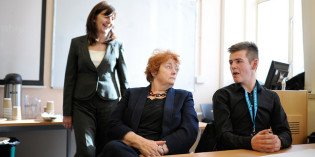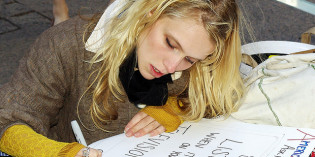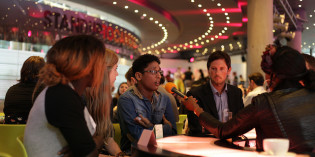Involving young people in democracy

The Scottish independence referendum raises questions about the suitability of using referendums as a ‘test bed’ for a lowered voting age
Educating 16 and 17-year-olds about voting and citizenship takes time, says Andrew Mycock, and the Scottish referendum was a divisive introduction to politics for some of them. Nor is it mere coincidence that 18 is the voting age in 27 of the 28 EU member states. Similar PostsOur student generation has been disenfranchisedVotes at 16: […]

Enfranchising 16 and 17 year olds won’t create a new politics, but a more inclusive version of politics as usual
We need an intelligent debate on whether 16- and 17-year-olds should vote in the EU referendum, says Richard Berry – not least because the notion that different age groups have very different policy priorities is misguided, at best. Similar PostsThe purdah controversy – setting the rules of the referendum gameSwitching off E4 on election day is a bold […]

The Scottish independence referendum shows that young people can be mobilized politically given the right circumstances
16 and 17 year olds were entitled to vote for the first time in any election held in the UK in the Scottish independence referendum. Advocates of the reform argued that it would help to engage younger people in the political process, setting the stage for greater engagement in democracy over future election cycles, while […]

Experiments and eligibility cutoffs show that voting is habit-forming
Past research has found a correlation between voting and voting again in future elections, but is there a causal link? In new research which uses Get-out-the-vote and voter eligibility cutoff data from across the US, Alexander Coppock and Donald Green find that there is such a link: voting in one election increases the likelihood of […]

Recent demonstrations across the UK are not a sign of rising political participation amongst the young
In recent months, thousands marched in anti-austerity protests and thousands rallied in solidarity with refugees. Is the attendance of young people in such events signalling a sea change in youth political engagement, despite the low turnout in elections? Maria Grasso argues that although mass rallies put political activism in the news, empirical research shows that political […]

Deliberation’s domain extends well beyond Parliament
Involve, a think tank and charity which specialises in public participation, recently published a report by Simon Burall on democracy as a deliberative system, inspired by the work of the political scientist John Dryzek who responds to Burall’s work here. Similar PostsInvolve’s ‘Room for a View’ represents an important intervention in the debate on democracy’s future […]

How can we get more young people voting in elections? Start by abandoning the myth of ‘politically alienated youth’
The UK has the widest gap in voter participation between older and younger citizens in the OECD. Many argue, that despite this, millennials and young people in general are not alienated from politics, but that they are engaged to an extent, but not necessarily in traditional ways. Stuart Fox argues that in order to get […]

Granting 16 and 17 years olds the right to vote is not a panacea for youth engagement in politics, but it is necessary for democracy
The voting age for UK general elections is 18, meaning that 16 and 17 year olds aren’t eligible to vote, despite being adults for the majority of a five year parliament. Research has shown that it would be an effective tool in narrowing the UK’s turnout gap between old and young – the widest in […]

In order to foster a shared appreciation of the EU’s historical role, better public discourse and education are required
The European Union, and its forerunner organisations, have never achieved popularity in the UK, and even in Europe there are signs that public opinion may be turning against it. Nils Röper argues that in order to foster a shared appreciation of the EU’s history, and its role in uniting a divided and war-torn continent, a […]



 Democratic Audit's core funding is provided by the Joseph Rowntree Charitable Trust. Additional funding is provided by the London School of Economics.
Democratic Audit's core funding is provided by the Joseph Rowntree Charitable Trust. Additional funding is provided by the London School of Economics.